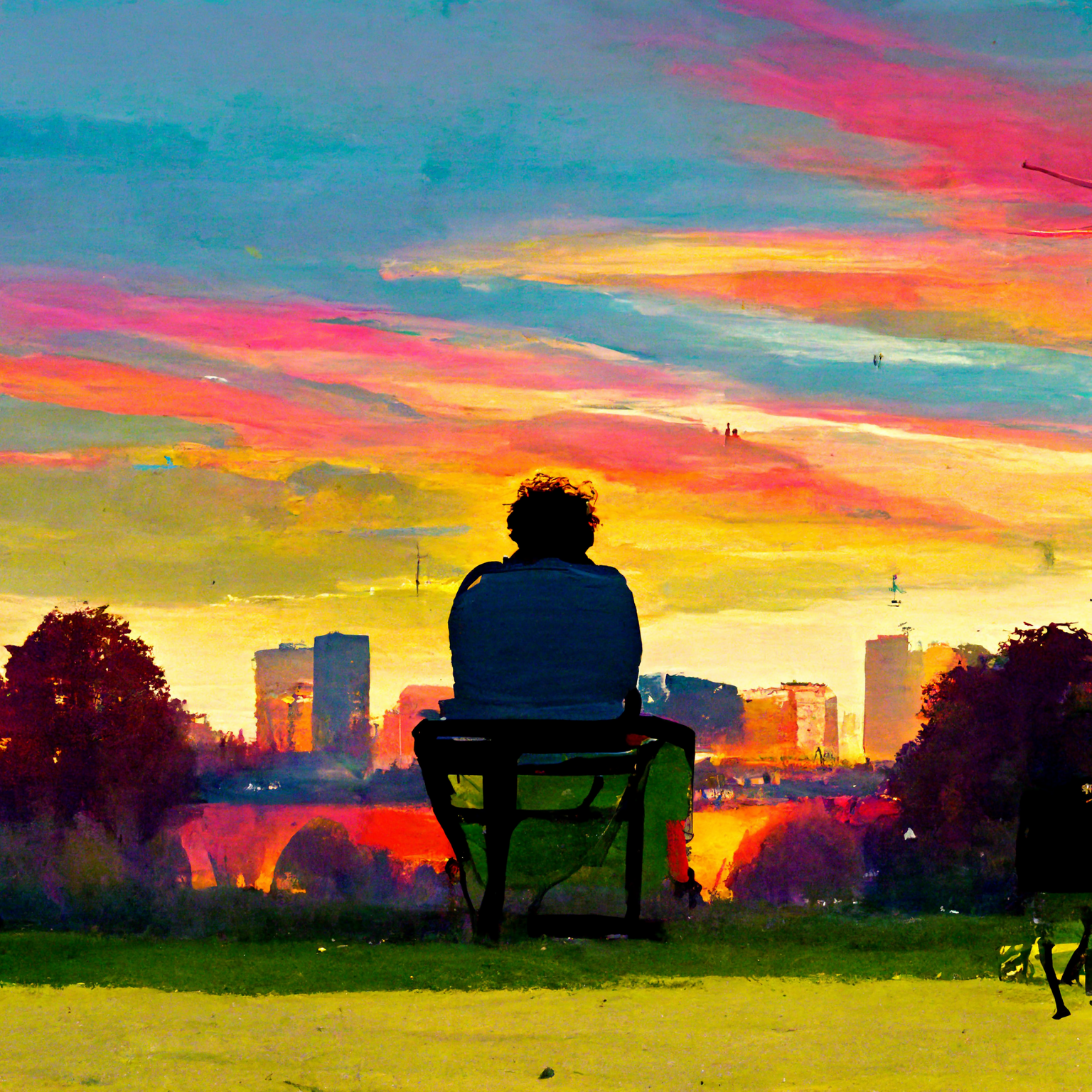Ideas for creative people
This essay is a review of the book Show Your Work. Here, you'll find ideas for creative people.
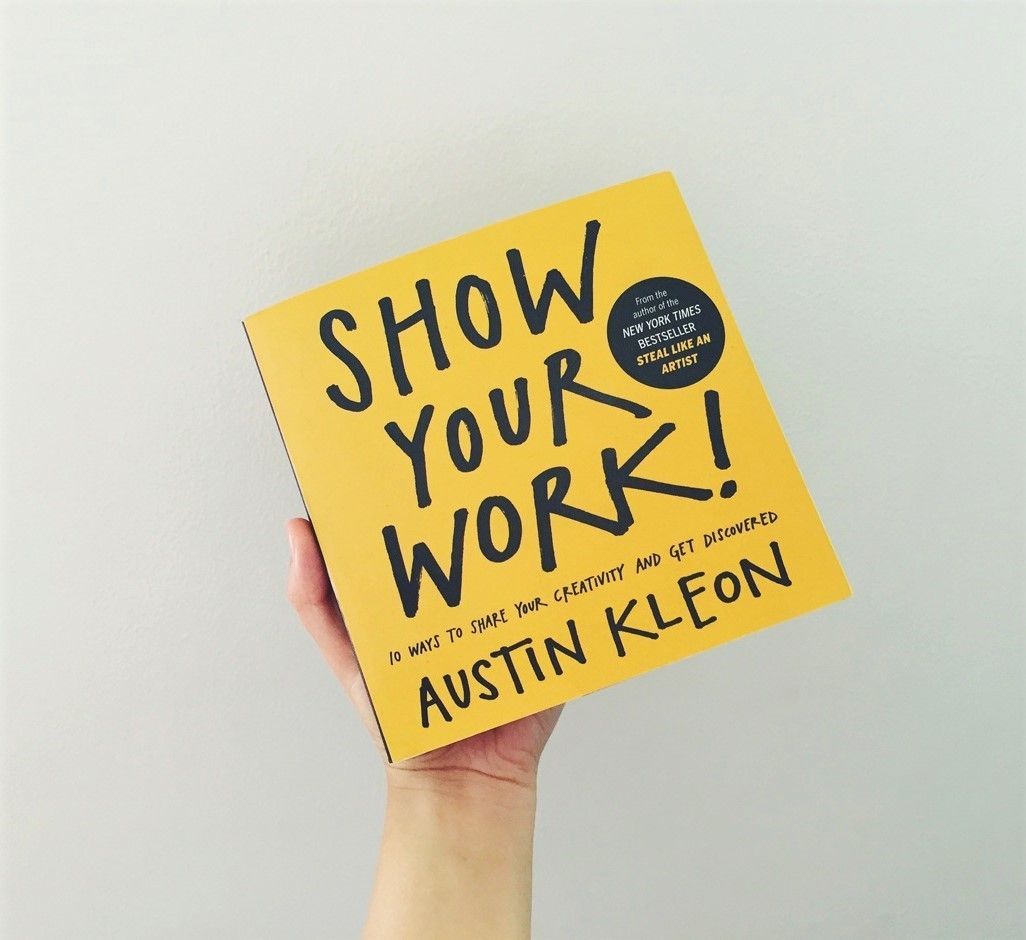
This post will review the book Show Your Work!, authored by the writer and artist, Austin Kleon.
I'm reviewing it because I found it to be an inspirational book, and the ideas are worth sharing with other creative people. Thanks to the YouTuber Ali Abdaal for recommending it to me.
The book review in a sentence is: this book is short, well-written, easy to read, and powerful. Do consider reading it, especially if you are interested in being creative.
See below for the longer review... The review will discuss three key ideas in the book and expands upon them.
If you are creative, then you will have an interest in.... something. You might be interested in words and therefore find books, poetry, history, or writing particularly interesting. Or maybe you like music. Listening to, composing, and reading music.
It might be painting. Or Sculpting. Singing. Design. Dance. Animation. Acting. Computer coding. Or, whatever... A creative person at the start of their journey might look around see others succeeding at any of these activities, and naturally ask themselves:
"how should I get started?"
This is a logical, reasonable question. And other questions might follow. Like:What is my style? What are my interests? How will I know if what I do is good? Will others like it? Where do I begin? How?
The questions might be endless. Indeed, human thought and language really is infinite! (1) Kleon urges creative people to find their voice through doing. Indeed, how can a person know what to create when they have no experience in creating something?
How can an artist know what to paint?
A writer know what to write about?
A sculptor know what to sculpt?
A coder know what to code?
The answer is that they cannot know; they discover their voice through doing.
In other words, finding your voice requires using it. It means start writing. Make music. Paint. Sculpt. Design. Act. Code.





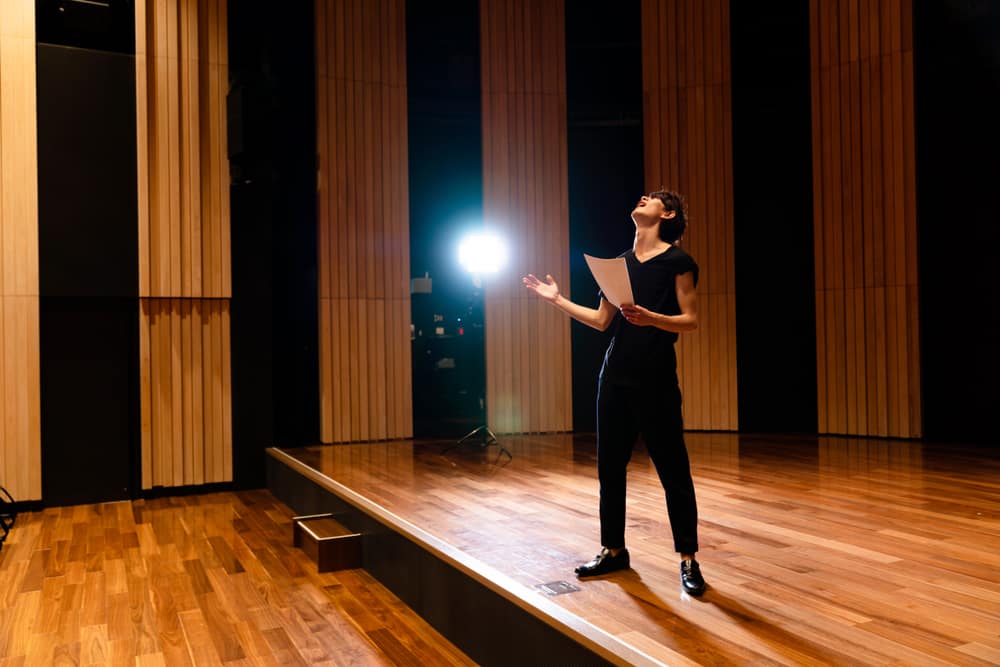

Stop thinking about your creative interests and start doing them. In the process of doing, you'll learn what your interests are. You'll find your writing style, how to paint, or what acting roles suit you. This idea resonated deeply with me, and gave me the inspirational kick up the arse to start this website, despite not having any idea really what I was doing with it.
Now I've written around 30 things on it, I feel so grateful for having started it, and in some sense, I wish I'd started earlier! Being creative by doing also means putting yourself out there, because it's about what interests you despite what others might think. Others might include disapproving parents or even friends.
One psychologist recounts a famous Carl Jung quote, in which he states (2):
"The fool is the precursor to the saviour".
Now, I'm no Christian, and do not really find religious ideas attractive, but the idea is powerful. It means that in life, whether in creative pursuit like making music or writing on a website, you have to put yourself out there, make mistakes, and learn by doing. More than this, what it really means is that you must be the fool! When you do something new, you will do stupid things (because you're new to it) and be embarrassed - but maybe this is a necessary precondition to what comes next (potentially success).
This process of doing is naturally what comes before being "the saviour". The saviour could also be morphed into "becoming competent" or "talented". Or it could mean becoming a "brilliant musician", an "authoritative writer", or an "accomplished actor". Finally, this idea has some sound psychological underpinnings.
Take the maxim: action precedes motivation. What this means is that quite often people do not wake up motivated to do something (3). Instead, they wake up, do something, and through doing something, they feel motivated. Imagine a depressed person. When they are not feeling depressed, they may enjoy going walking, swimming, or playing football. But when they feel depressed, they think about the idea of going walking, swimming, or playing football. Because they are depressed, the idea of these activities seems difficult - even pointless.
And so they stay in bed.
But motivation precedes action, and a great way for depressed people to help themselves is for them to try and continue doing the things they would normally enjoy doing, even if thinking about them feels terrible, pointless, or depressing (4). Even though they feel depressed, when they get outside in nature and are walking, this may make them feel a little better, certainly better than how their mind had imaged it (as a personal note, I met my girlfriend when I was feeling depressed, and joined a friend to do something social, even though I wasn't feeling very positive).

Human beings are thinkers (you do not have to be a philosopher to be a thinker). All of us: the cleaners, lorry drivers, salespeople, office workers, psychologists, priests, historians, and hunter-gatherers - are thinkers. In fact, one idea about thought itself is that our thoughts die so that we don't have to (5). We simulate crossing the road mentally before actually crossing the road, which helps to keep us alive! (6)
And yet we think ourselves into oblivion. We ask ourselves endless, unanswerable, and self-critical questions questions.

We doubt our innate talents, abilities, interests, and preferences. Indeed, others, especially those close to us, may make this worse. Why start being creative when there are so many thoughts flying by, so many mental questions unanswered? Thoughts say. Why bother? Others will think I'm stupid. I don't know how to start. I'm not sure what the point is. I'm not even a good singer, writer, painter etc.
Well, thoughts are thoughts; they are guesses about the world, not truth about the world itself (4). So just start. Motivation precedes action. Start by doing something. Sop thinking! And start doing, creating. Which brings us to the second idea...
When you start "doing", you won't be.... very good. But that's okay! Creative pursuit, like making music, writing, acting, painting, coding, is a process. And as you learn through doing, you'll be implementing a increasingly sophisticated process of action. Being a "good writer", for example, is a process that involves much more than just the "doing" of writing itself. It involves reading, ideally as widely as possible.
The prolific fiction writer, Stephen King, for example, reads more than a book a week, which includes reading while he eats (7). And the statistician-philosopher Nassim Nicholas Taleb has spoken of an "anti-library", in which a person should aim to have more unread books than read books in their personal library, because what we do not yet know is far more important to us than what we currently do know (8).
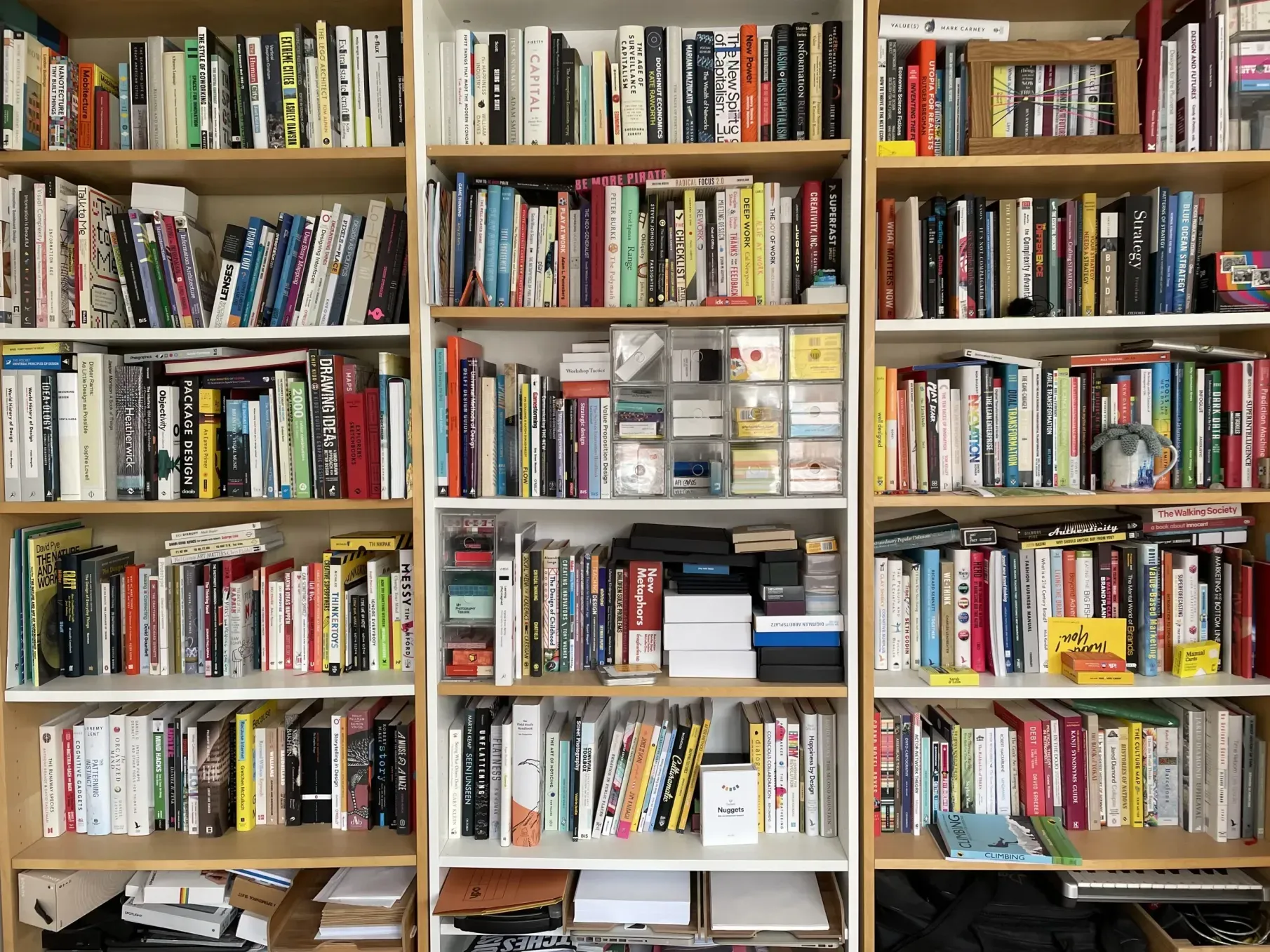
This seems to be true in other creative domains, too. Musicians, painters, actors, sculptors, singers, actors and the like cannot expect to rush toward success without first being involved in a process of discovery about their respective creative fields. In other words, getting to a finished product - like writing great book, painting a beautiful painted picture, or acting in a respected role - requires first being a student of your field.
This idea aligns to an Orwellian sentiment. Specifically, his idea that "being educated" has little to do with how much school or university a person has completed, but rather how curious they are about the world (note that traditionally educated people may also have this curiosity, too, 9). Being educated creatively means being engaged in a creative process, in which a person reaches out to many different ideas, concepts, and gets support from others, in order to work towards creating something interesting, like writing a worthwhile book others might enjoy reading, composing a meaningful piece of music, or creating some beautiful computer code.
Reaching out, getting curious, and being involved in a process of creative improvement is essential if you want one day to create products others may enjoy. The joy really is in the doing, and this process is where all the learning is, the mistakes are made, where the future returns compound.
Success in creative fields almost inevitably requires engagement in some process that demands many failures, attempts, and feeling a bit stupid.
But that process is what makes creative people who they are, and who knows where that creative practice might take a person? Austin's ideas - finding your voice through doing and process over product - mean little without one final concept.
Well, what if you just... give up? Nothing! No book written. No acting in movies. No performing in front of audiences. Creative pursuit requires continual attention! Perhaps, Kleon suggests, that the successful creative people are those that simply stuck around the longest.
Let us learn from the evidence in habit formation (3). James Clear cites the concept of critical thresholds as key to habit formation, which is relevant here.Imagine you started learning a language. Let's say it's Spanish. You've been practicing for months, but it's been difficult, and you're not feeling like you've made that much progress. You're doing the work. You're involved in the creative process. But it just feels sluggish. The Spanish words make a bit of sense, but not much.
The grammar is sometimes understandable, but most of the time it just doesn't make sense! As in our elephant friend below...
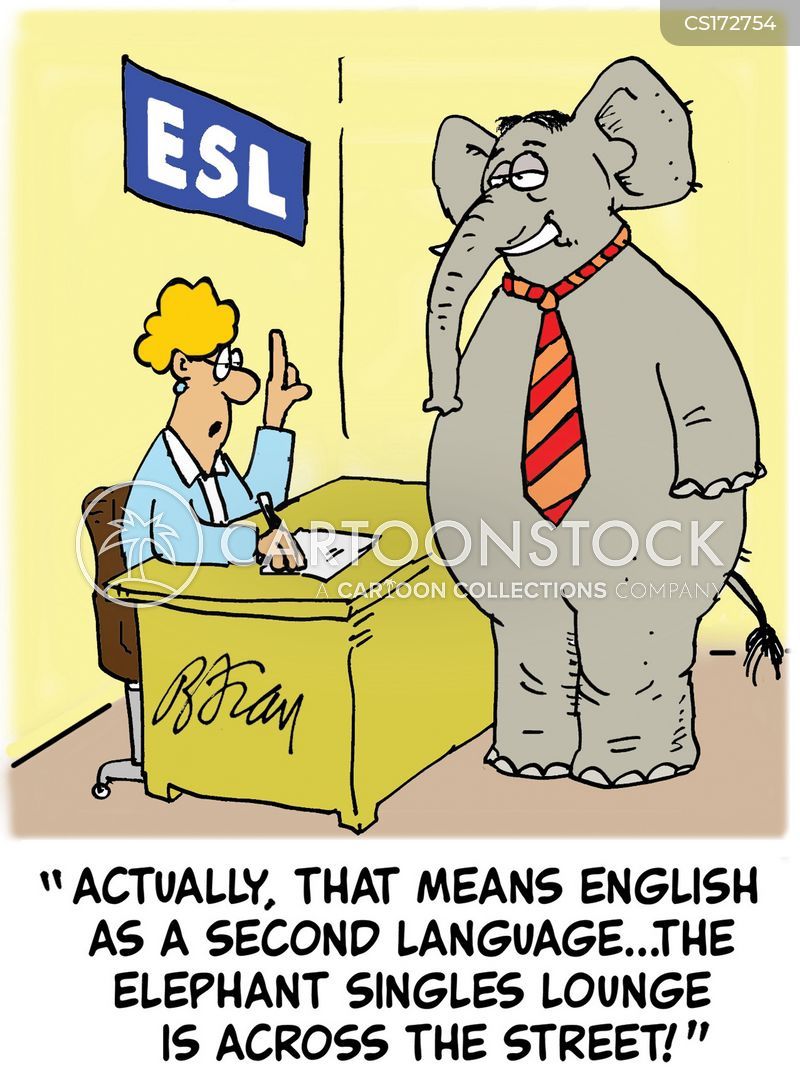
This experience is, I believe, pretty normal for most adults who have attempted to learn a second language. It's frustrating! Take a look at the graph below. Our Spanish student is at point B.
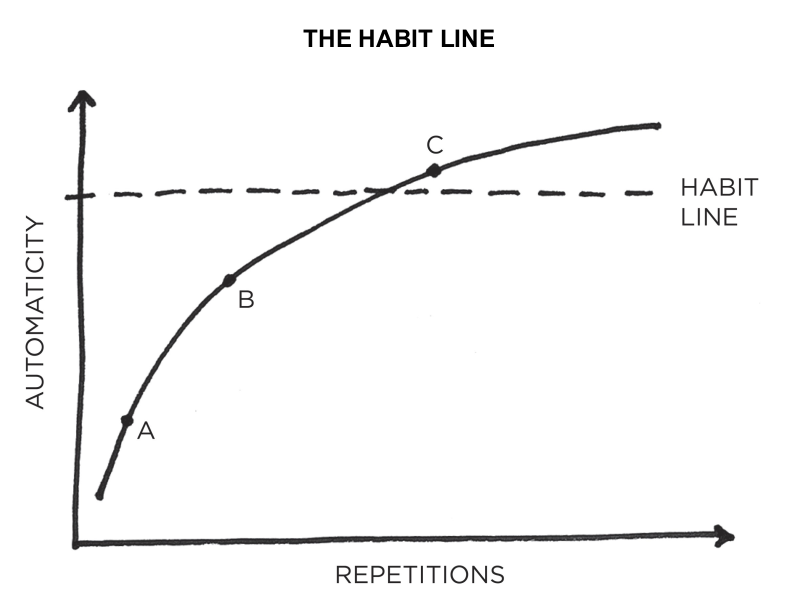
What seems to happen in habit formation (such as learning a new language as an adult) is that it feels difficult for days, weeks, months. Until one day...You go from point B to point C, crossing the critical threshold. At point B, our Spanish learner still finds everything really quite difficult, and considers giving up their creative pursuit. But let's say they don't give up.
They keep going despite their dearth of understanding and frustration with the lack of progress. One day, perhaps after 6 months, maybe 12 months, they realise that they can speak basic Spanish! They can introduce themselves, listen to others speak a basic conversation, ask questions, count numbers, and recognise basic grammar patterns. But another world exists, where, at point B, the person felt that no progress was being made, and they gave up. Lots of people attempt to form new habits but give up before they reach the critical threshold, where they really begin to feel and notice their progress.
Crossing the critical threshold of learning Spanish might feel like this:
"Okay, so I've been doing this a while.... And....nothing, no progress. It's difficult, and, to be honest, I have a depressed outlook towards this, it's just too difficult. Actually, yep. I hate this! Okay, but despite hating this, I'll still practice anyway, I guess. Ugh - why am I practicing this? Then, wait a second. Hang on. I'm improving! I can feel the improvement, I'm actually learning Spanish. Okay, I'm still pretty bad, true. But compared to where I was when I started, I've come a long way!"
A related idea comes from Taleb, who notes how it is better to fail early when the cost is small (and known) in the potential knowledge that one day the pay-off could be large, essentially infinite (10).
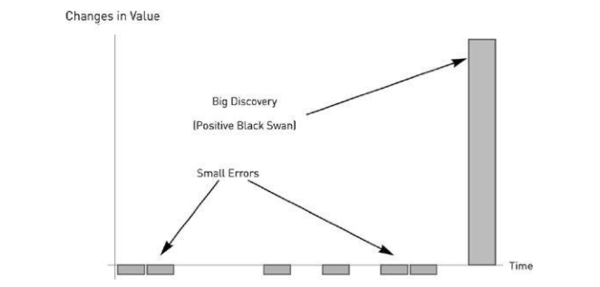
In essence, creative pursuits (like learning Spanish, writing on a website, or playing music) stumble forward often making small errors. But there is always the potential for a huge pay-off. When I write on my website, for example, I make errors. These errors are grammatical (not enough proofreading); they are informational (writing false things); the mistakes are to do with style (bad writing).
I might be boring my readers. Or writing too technically. Or not writing technically enough. Or, whatever.
The amount of mistakes and "small errors" I could be making are... infinite.
But the errors are small (and known). In other words, I am making the errors at a low cost. And because the errors are both small and known, I can articulate them to myself, which helps to keep me going, see below:
1) At the moment I don't really have many readers
2) It's okay to mistake the mistakes, because I'm doing this voluntarily and I enjoy writing for the thing itself
3) Nobody really cares that much
4) I know that by practicing writing on my website I'll improve at writing, especially if I can get feedback from others, or I am willing to write and rewrite my posts as I update my knowledge basis
5) By practicing now, I am preparing myself for the future, where I would like to write books for paying readers
So, we see that by making small errors really is part of the process, it's okay, and it might even have pay-off in the future. For example, let's say you've written a book. The book that you've published may one day become super relevant. This is what happened to the T.V. adventurer, Simon Reeves, who left school with barely any GCSE's, but with went on to publish a book about potential future terrorism, which was released before the attack of 9/11 (11). When he published his book, the response was.... nothing. Not a drop in the water. People weren't interested.
Nobody cared.
But when the attack on 9/11 happened, an outcome that his book was broadly discussing as a potential threat, his phone started ringing, and suddenly he was on T.V., eventually presenting primetime travel shows on BBC. Put differently, if you keep going, and create things, someone may offer you a role in a film. Or like your music. Your painting, sculpting, dancing, coding.
Both ideas - critical thresholds and small errors with big pay-offs - capture a statistical fact about success in creative fields: it is nonlinear. In other words, unlike practicing mathematics, practicing creativity leads nowhere, nowhere, nowhere - until suddenly, it leads somewhere! Mathematics is a set of building blocks, where if I know A, then I use that knowledge to move onto B, which then lets me understand C, and so on (roughly, addition, algebra, calculus...). But I can not get to C without knowledge of A because it is linear - I need to know about what came before in order to progress.
But in creative fields, I might go from A, to A, to A, to B, to A, to A, to C - then suddenly jump to J! Small errors continue and continue, then one day (maybe) some kind of critical threshold is crossed, and I am catapulted into some kind of success at point J (yay point J!). This linear/non-linear pattern is represented graphically below, again taken from Taleb's Antifragile (10):
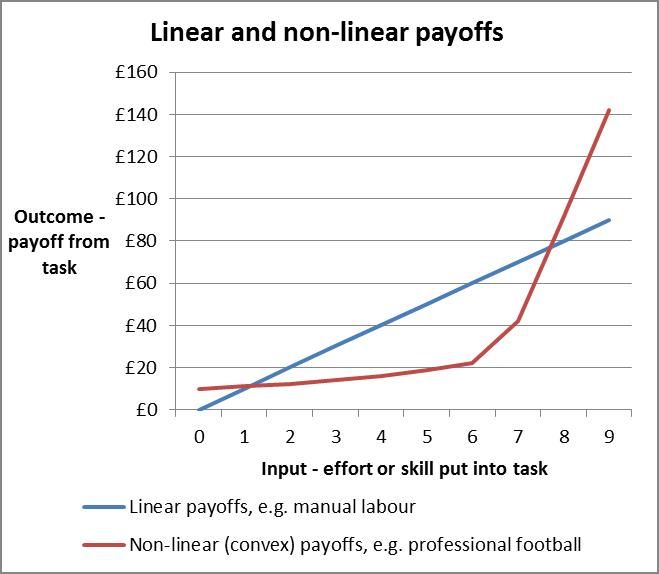
For me personally, point J might represent writing a book that gets popular, it might mean somebody influential shares my writing, or it could be something completely different for a different creative person (someone likes your music, you get called up to act, a local gallery wants to display your work, an employer likes your coding skills). None of us never really know what's around the corner (nor can we discover it). The technical philosophical phrase for this problem is: the problem of induction.
Back to Taleb (who built on Bertrand Russel's explanation) who calls this problem the turkey problem (8). Consider a turkey's predicament in the lead up to Christmas. The turkey is fed every day, and life is good. Each day the turkey receives evidence that life is indeed good. Food just keeps on coming...
But then!
One day the turkey is killed and eaten at a family Christmas (or Thanksgiving) table. The turkey problem is a difficult one for all of us - fundamentally it illustrates that none of us know what is around the corner (at the macro-level, think 2008 financial crisis, COVID pandemic).
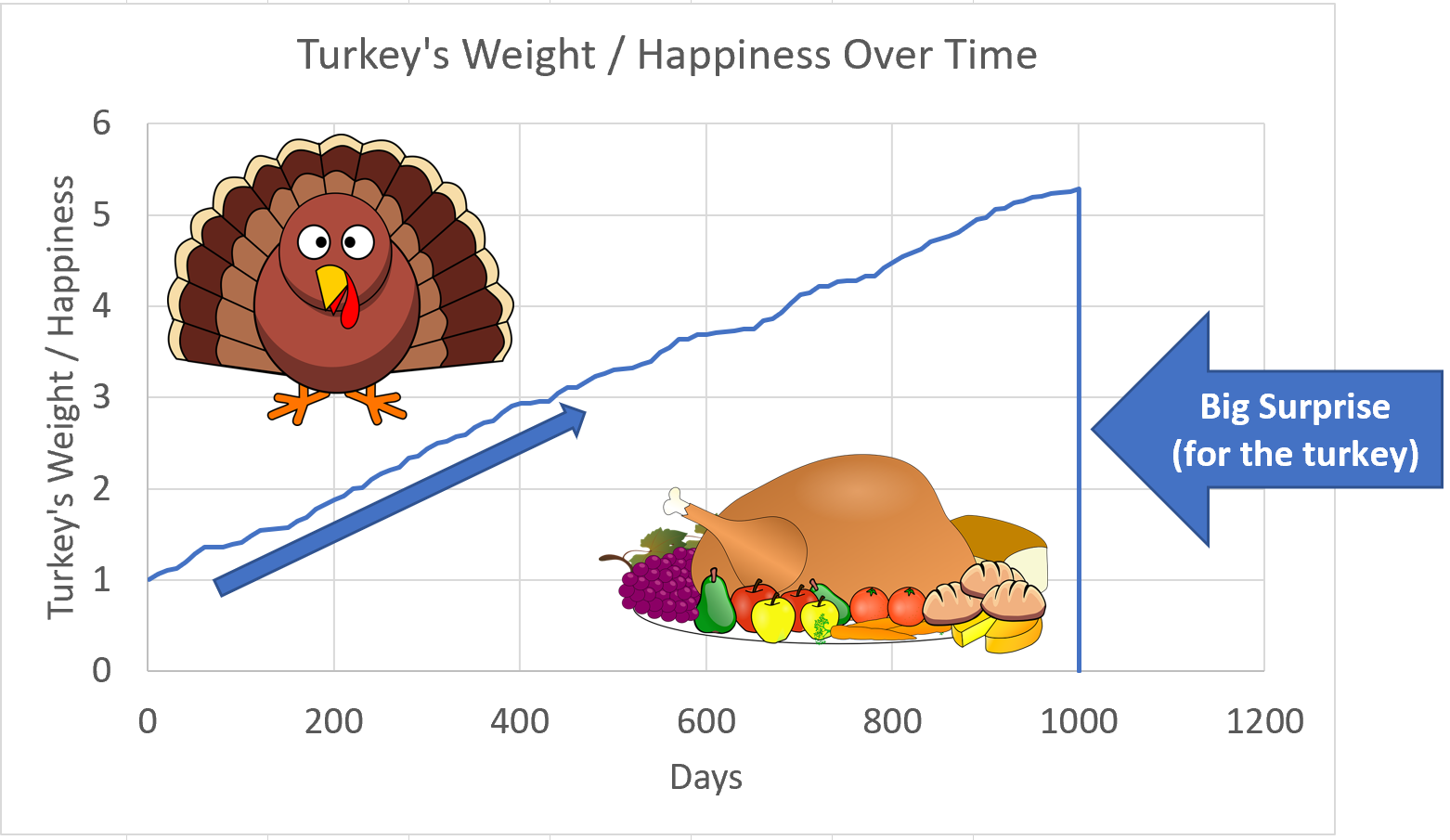
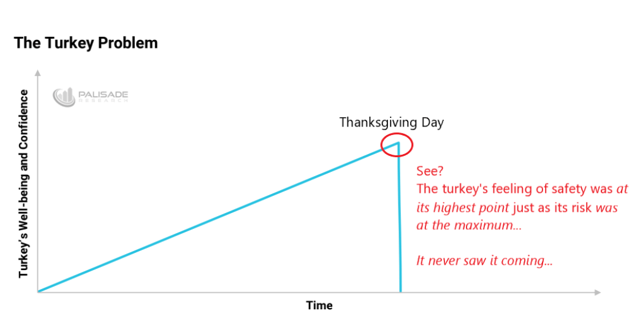
Perhaps creative people can fight against the turkey problem in some manner by pursuing their creative interests now, so that the opportunities in the future may gravitate towards them, or at least they increase the probability that good things may come because of their creative efforts (note the reverse is also true, a great opportunity may arise out of nowhere - meaning happy days for us turkeys!).
Though we may feel stupid stumbling along learning Spanish, or in doing any other manner of creative pursuits, there is always the potential for big pay-offs, and these come only when you cross some kind of critical threshold, which is achieved by keeping going. Now, there is a bit of a myth here, too. The myth is: if you don't give up on your creative thing (writing, language learning, painting etc), then you will achieve your dreams! The American Dream baby. In other words, hard work and willpower! Is this right? Let's think about this.
The psychologist Roy Baumeister has studied this notion of "willpower". The findings were reported by the author Newport. (12) According to Baumeister, willpower might be thought of as a kind of resource which can be depleted, a muscle that gets tired, needs rest, and is not at all infinite. In fact, people with seemingly "lots of willpower" actually might design their lives in such a way as to minimise the amount of willpower they actually have to exert. What this means is that if you want to be creative - and to keep going - you have to make it easy for yourself!
You have to realistic with your circumstances, your resources, your goals, and your finite levels of willpower. If you work, for example, all day on a building site as a labourer, you're going to finish the day physically exhausted. Your levels of willpower to focus on a complex task - like a creative process - will probably be significantly weakened after work. Given this, maybe allocating willpower to be creative might make more sense at the start of the day, before the physical exhaustion is understandably overpowering.
Or maybe there are options to engage creatively on the way to work, where, because of mobile computing technology (phones), you might listen to a book, or to a podcast with you favourite artists, or to a story in Spanish for language learning (13). Obviously, people's personal circumstances are different. We all have access to differing levels of money and support from our families. Some people have families who are wealthy, but are emotionally neglecting. Some have families who are not so well off, but are supportive. Some may not have much wealth, and who are actively unsupportive. And others still might have wealth and emotional support.
The point is, all of our circumstances are different, and people have to work with what they have (remember, too, that none of us asked for our families either!). For most people in most places, life itself is difficult. And, probably, we all have finite willpower resources. Because of these reasons, continuing to pursue creative things over the long term might largely be a matter of somehow supporting yourself by making it easier to be creative. This may involve getting support from others or by allocating your scarce willpower resources in appropriate ways.
Another way is through financing your creativity. Most creative people, including Kleon, work in other jobs (Also, Chekov was a doctor, Kafka worked in insurance, Orwell worked in the Burma and was later a teacher, King published his first book while working at a laundry company, Kurt Vonnegut worked at a Saab dealership, and the gentle philosopher Spinoza was a lens maker). Regular work gives creative people structure, social interaction, and importantly - a stable income.
By working in a regular job you create a structure to earn money and to have a routine, which then allows you to work creatively around this - you can do what builders call "workarounds" (when building something, inevitable problems will arise, and the challenge is finding a solution to make it work).

If you must commute to work but want to be creative, find a workaround (like listening to audio in the car). If you work for Uber Eats, don't work on Wednesday evening (so that you can attend the language class). If you are exhausted after a day's work, find a workaround that will suit the allocation of your scarce willpower resources (be creative in the morning, at the weekend etc).
And we might all benefit from reading a book like Deep Work (where creative people's daily habits are discussed) or two I'm looking forward to reading, Daily Rituals: How Artists Work, and Kleon's newest book, 10 Ways to Stay Creative. We are at our best creatively - maybe - when we can learn from others, and integrate those lessons into our own personal creative interests.
So, I think that there is truth in the American Dream, but there is no need to abandon realism. Many other things are important besides being creative, but these other things may actually support creativity, and help it to thrive. In an ideal world, creative people would stick around, doing what they love doing (American Dream style). In the real world, creative people might consider their actual options, ways of thinking, how they might seek out support, or identify which practical areas will support their personal circumstances - whatever they may be.
Three ideas from the book where discussed here. In the book itself there are 10 chapters dedicated to why creative people might be more creative, most of which I haven't discussed. For people with a creative bent, I'd say it's a brilliant book, and definitely worth a read (again, it's a short read, and also full of creative art the author has himself drawn).
The message from Kleon is for people to Show Their Work! He gets his message across with style, and it raises the open and intriguing question for the reader... What might you create?
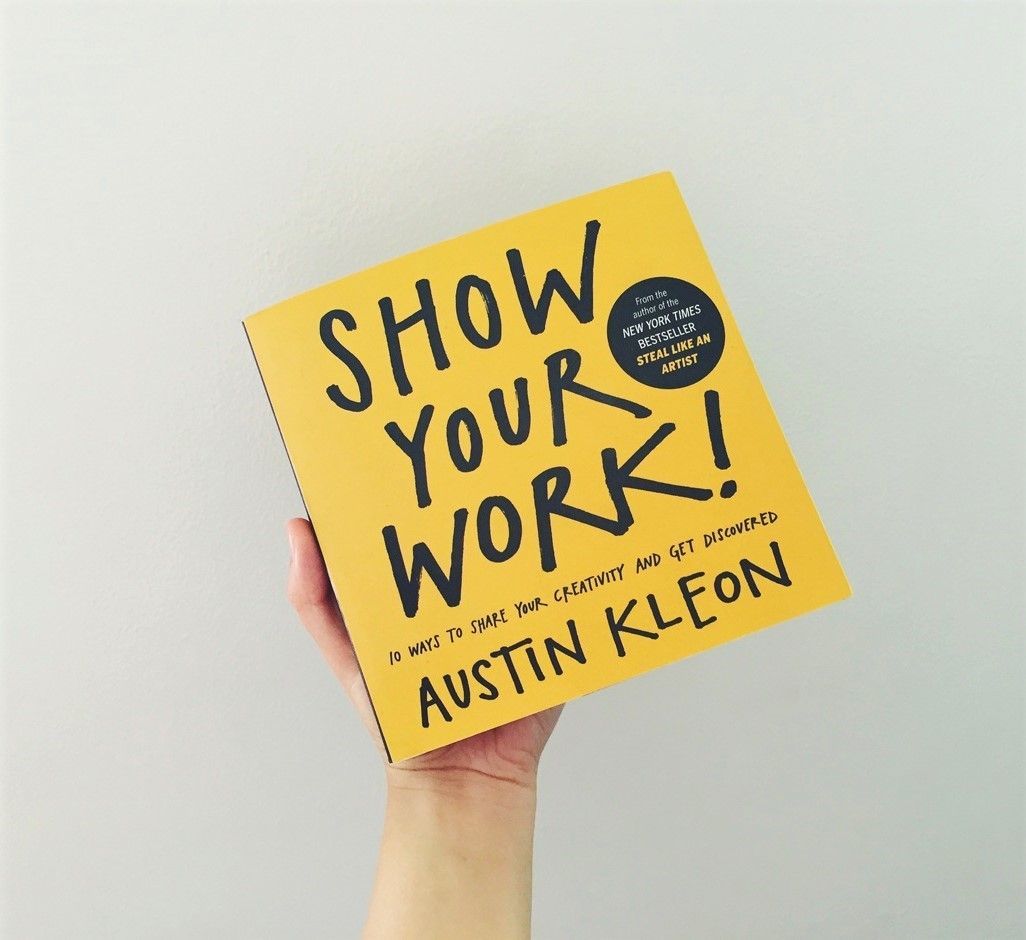
1) Pinker's The Language Instinct (1994)
2) Peterson's 12 Rules for Life (2018)
3) Clear's Atomic Habits (2018)
4) Satterfield's Cognitive Behavioural Therapy (2015)
5) Quote from the philosopher-mathematician Whitehead https://www.goodreads.com/quotes/10092515-the-purpose-of-thinking-is-to-let-the-ideas-die, which I originally discovered in a Peterson's 2017 Personality and it's Transformation lecture series at the University of Toronto https://www.youtube.com/watch?v=kYYJlNbV1OM&list=PL22J3VaeABQApSdW8X71Ihe34eKN6XhCi&ab_channel=JordanBPeterson, though unfortunately I can't recall which exact lecture it was from.
6) Dawkin's The Selfish Gene (2016)
7) King's On Writing (2000)
8) Taleb's The Black Swan (2007)
9) Orwell's The Road to Wigan Pier (1937)
10) Taleb's Antifragile (2012)
11) Reeve's Step by step (2019)
12) Newport's Deep Work (2016)
13) Saylor's The Mobile Wave (2013)
